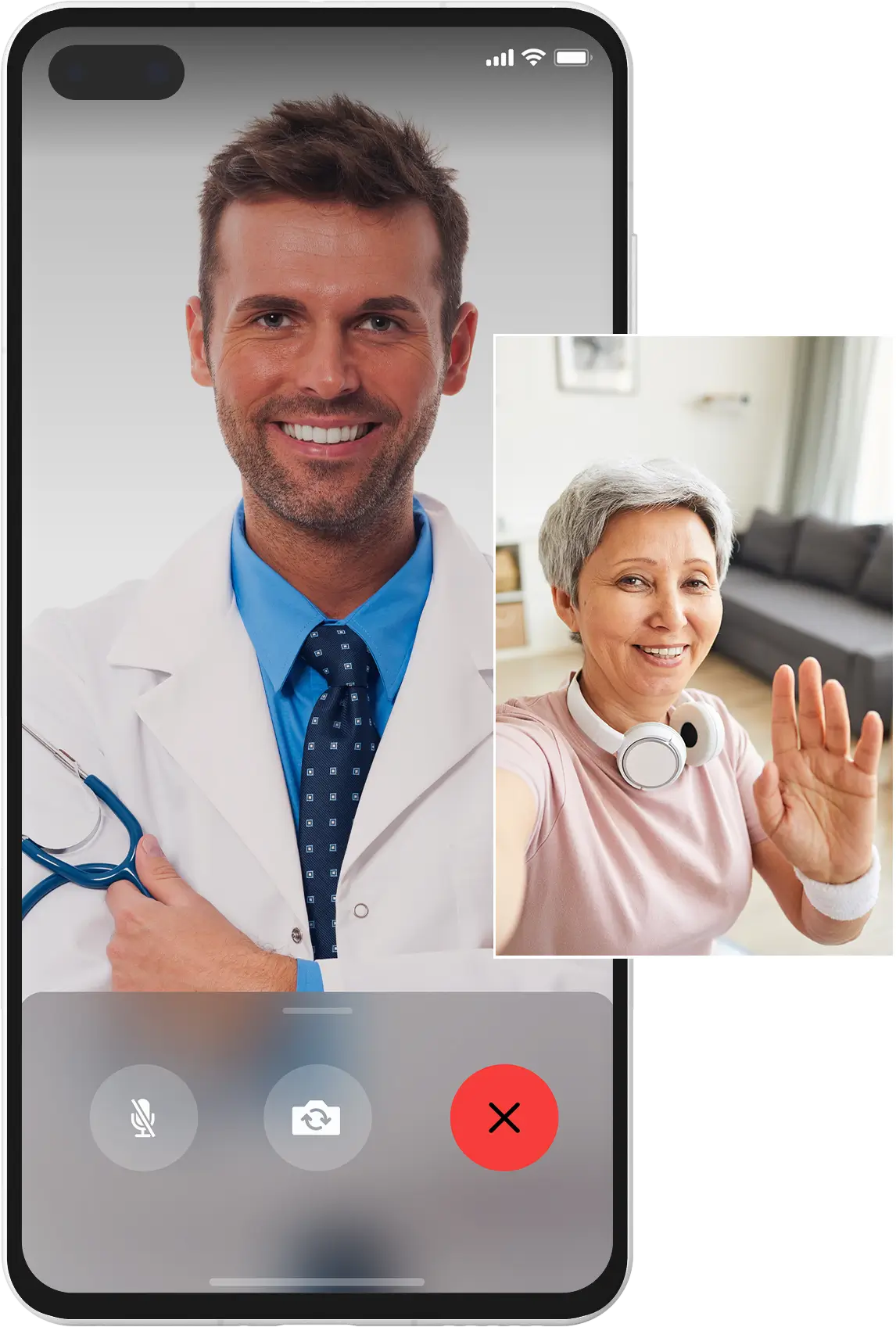Table of Contents
Join Now and Get Your First Consultation Free!
Secure your health with a yearly membership for just €29.90. Sign up today and enjoy peace of mind with expert care at your fingertips!
Get Started
What Online Doctors Prescribe Most
Online doctors frequently prescribe medicines for long-term conditions, sensitive issues and common primary-care problems. Research shows that telemedicine weight-management programs often prescribe Wegovy® (semaglutide), while ED telehealth services focus on sildenafil and tadalafil. Telephone and telepharmacy studies highlight remote refills and new prescriptions for common conditions, and online tools can improve adherence to antihypertensives and other chronic therapies. In some settings, online telemedicine also provides advance provision of abortion medications. This article explains what “most prescribed by online doctor” really means, where these patterns come from, and how a secure platform like doctors365.org can support safe prescribing, repeat prescriptions and medication reviews. Learn when online care is appropriate, when you must seek in-person or emergency help, and how to prepare for a productive online consultation.
Medical disclaimer: This article is for educational purposes only. It does not replace personal medical advice, diagnosis or treatment, and it is not suitable for emergencies. If you think you may be experiencing a medical emergency (for example, chest pain, difficulty breathing, signs of stroke, severe bleeding or severe allergic reaction), call your local emergency number or go to the nearest emergency department immediately.
Author: Dr. Diellza Rabushaj
1.What are the “most prescribed” medicines by online doctors?
Online doctors are now part of everyday healthcare. From weight-loss programs to erectile dysfunction (ED) treatment, from repeat blood-pressure tablets to urgent antibiotics, a growing number of prescriptions are being written after video, audio or chat-based consultations instead of traditional in-person visits.
But what do online clinicians actually prescribe most often?
Based on the research you shared, the most common types of medicines prescribed or managed through telemedicine include:
- Branded anti-obesity medicines – especially semaglutide (Wegovy®) in structured telemedicine weight-management programs [1].
- Erectile dysfunction medicines – mainly sildenafil and tadalafil on dedicated telehealth platforms [2].
- Refills and new prescriptions for decongestants, antibiotics and pain medicines for common primary-care problems such as upper respiratory infections and low-back pain [3].
- Chronic disease medicines, notably antihypertensives, where online refills are linked to better adherence in some groups [6].
- Contraceptives, anti-asthmatics, proton pump inhibitors (PPIs) and NSAIDs, which often appear in repeat-prescription and adherence studies [7].
- Mifepristone and misoprostol for abortion care in specific online telemedicine models [9].
This article walks through what each of these research findings tells us about “most prescribed by online doctor,” and how a service like doctors365.org can safely support you with these medicines.
2. How we know: what the research says about online prescribing
The studies you provided cover different pieces of the puzzle:
- A telemedicine weight-management program where patients received branded anti-obesity medications such as Wegovy® [1].
- Telehealth platforms for erectile dysfunction, comparing how they prescribe sildenafil and tadalafil [2].
- Classic work on telephone prescribing in family medicine, showing which medicines are most often prescribed remotely [3].
- A broad reflection on online prescriptions and safety [4].
- Telepharmacy services in a large clinic system, with thousands of remote prescriptions every month [5].
- The link between health IT (including online refills) and adherence to antihypertensive medicines [6].
- A detailed look at repeat prescription adherence, including which medicine types patients refill reliably (e.g. contraceptives) and which they don’t (e.g. PPIs, NSAIDs, anti-asthmatics) [7].
- A national public teleconsultation platform in India (eSanjeevani), showing which body systems are most commonly involved in remote consultations [8].
- Advance provision of mifepristone and misoprostol via online telemedicine in the US [9].
Together, these studies don’t give us a single global “top 10 list”, but they do show clear patterns in what online doctors often prescribe and manage.
3. Weight-loss medicines: Wegovy® and telemedicine weight management
One of the strongest examples of a “most prescribed” medicine in an online setting comes from a telemedicine weight-management program studied by Shukla and colleagues [1].
3.1 Who were the patients?
In this retrospective analysis of people receiving branded anti-obesity medicines via telemedicine:
- Mean age was 47.2 years.
- Average starting weight was 220.9 lb and BMI 35.2 kg/m², indicating class II obesity on average.
- Most patients were White (63.7%) and female (72.2%).
- On average, patients had 2.2 weight-related comorbidities (for example, diabetes or hypertension). [1]
3.2 Which medicines were prescribed most often?
- Wegovy® (semaglutide) was the most frequently prescribed medicine, used by 70.3% of telemedicine weight-management patients in this program [1].
This shows how, in a specialised online clinic, a single drug class can dominate prescribing.
3.3 What does this mean for an online doctor consultation?
If you book an online consultation for weight management (where it is legally available and clinically appropriate), a doctor might:
- Assess your BMI, comorbidities and previous weight-loss attempts.
- Discuss lifestyle interventions as the foundation of therapy.
- Consider GLP-1-based therapies (like semaglutide) if you meet eligibility criteria, using evidence similar to that in this study [1].
On doctors365.org, suitable specialists for this type of care typically include:
- General practitioners / family doctors with an interest in obesity medicine.
- Endocrinologists / diabetologists, especially for patients with diabetes or complex hormonal issues.
🔔 Note: Not everyone is a candidate for Wegovy® or similar drugs. Heart disease, pancreatitis risk, pregnancy and other factors must be reviewed by your doctor.
4. Erectile dysfunction treatment: sildenafil and tadalafil via telehealth
Another clear theme in the literature is ED treatment provided through commercial telehealth platforms.
4.1 What do ED telehealth platforms usually prescribe?
Brink and colleagues examined 15 online platforms offering ED treatment [2]. They found that:
- All platforms evaluated offered medications for erectile dysfunction, primarily sildenafil and tadalafil.
- Most platforms provided free consultations, but patients had to pay for the prescription medicines themselves.
- Pricing for sildenafil and tadalafil varied considerably between platforms [2].
In other words, in the ED telehealth niche, phosphodiesterase-5 inhibitors (PDE-5 inhibitors) (sildenafil, tadalafil) are clearly among the most prescribed online medicines.
4.2 Privacy and contact with doctors
The same study also showed that:
- All platforms had privacy policies, but not all were fully HIPAA compliant (the US health privacy standard).
- Only a minority offered direct ongoing contact with physicians beyond the initial consultation [2].
This highlights the importance of choosing telemedicine providers that ensure both privacy and access to a real doctor, rather than a purely transactional prescription model.
On doctors365.org, ED discussions are handled by:
- General practitioners, for initial assessment and straightforward cases.
- Urologists or endocrinologists, for more complex situations.
5. Everyday primary-care medicines by phone and teleconsultation
Not all online prescriptions are for “specialised” topics like obesity or ED. A classic study by Spencer and Spencer looked at telephone prescribing in a two-doctor family practice – essentially an early form of telemedicine [3].
5.1 What did doctors prescribe most often by phone?
Over a two-month period:
- 31.0% of all telephone calls resulted in a medication prescription.
- Nearly 45% of these prescriptions were refills of existing medicines.
- Common new prescriptions were for:
- Decongestants,
- Antibiotics,
- Pain medications,
often for conditions such as upper respiratory infections, headache, low-back pain and bronchitis [3].
Even though this study dates from 1990, the pattern is familiar: remote care is often used for common, straightforward primary-care problems and refills.
5.2 What does this look like today, online?
Modern online doctors may handle similar issues via:
- Video or audio consults for coughs, colds, sinusitis or bronchitis-like symptoms.
- Analgesia and short courses of antibiotics, where clinically appropriate.
- Refills for stable chronic diseases, after checking you’re still doing well.
On doctors365.org, these scenarios are typically managed by general practitioners / family doctors.
6. Chronic disease management: blood pressure, refills and online adherence
A major role for online doctors is supporting long-term conditions, especially through repeat prescriptions and adherence support.
6.1 Antihypertensive medicines and online refills
Okobi and colleagues explored the relationship between health information technology (HIT) and the use of prescribed antihypertensive medicines [6]. They found:
- There was a significant association between using the internet to refill prescriptions and adherence to antihypertensive treatment.
- This effect was particularly strong among people with higher socioeconomic status [6].
In simple terms: people who used online tools to manage their blood-pressure medicines were more likely to take them as prescribed.
6.2 Repeat prescriptions and which medicines patients actually refill
Andersson et al. examined refill adherence across different medicine types [7]. Key findings included:
- The average adherence to repeat prescriptions was 57%.
- 21% of patients under-supplied (didn’t refill enough), while 22% over-supplied (refilled too much).
- Patients of general practitioners had higher refill adherence than those of hospital physicians.
- The highest adherence was for contraceptives (81%), while anti-asthmatics, proton pump inhibitors (PPIs) and NSAIDs had lower adherence (around 30–40%) [7].
This suggests that, in real life, some of the medicines most often prescribed and refilled online may be:
- Antihypertensives (e.g. blood-pressure tablets) [6].
- Contraceptives [7].
- Anti-asthma inhalers, PPIs and NSAIDs – but with lower real-world adherence [7].
Online doctors can help by reviewing your medication list, checking for missed refills and exploring barriers to adherence.
On doctors365.org, chronic-disease prescribing is usually handled by:
- General practitioners, for hypertension, asthma, reflux and mild depression/anxiety.
- Cardiologists, for more complex blood-pressure or heart-failure regimens.
- Respiratory specialists, for difficult-to-control asthma or COPD.
7. Telepharmacy: remote pharmacists and high-volume prescriptions
Telepharmacy shows what happens when you scale up remote prescribing and counselling.
Lam and colleagues described telepharmacy services in a large urban community clinic system [5]. Each month, services to around 12,000 patients included:
- 3,282 new prescriptions.
- 589 refill prescriptions.
- 2,800 refill authorisations.
- 250 medication assistance referrals (for example, help accessing low-cost medicines) [5].
Webcam-enabled consultations allowed:
- Improved privacy.
- Longer counselling sessions compared with traditional (in-person) pharmacy encounters [5].
The exact list of medicines is broad (covering many conditions), but this study shows that new and refill prescriptions across multiple drug classes can be safely handled remotely when supported by trained pharmacists and appropriate technology.
For you as a patient, this means an online doctor on doctors365.org can:
- Prescribe or renew medicines,
- While a local or online pharmacist provides detailed counselling and checks for interactions.
8. Abortion care medications via online telemedicine
Aiken and colleagues examined advance provision of mifepristone and misoprostol via online telemedicine in the US [9].
8.1 Who requested advance provision?
The study found that:
- The majority of requests came from people who were not yet pregnant but wanted the medicines in case they needed them later.
- Reasons included concerns about access to abortion services and a desire for control over reproductive health.
- Those requesting advance provision were more likely to be younger, have a higher level of education, and have a history of abortion or miscarriage [9].
Although this is a specific context, it demonstrates that mifepristone and misoprostol are among the key medicines prescribed via online telemedicine in jurisdictions where this is legal and clinically supported.
⚠️ Important: Abortion laws and telemedicine rules vary widely by country and region. The availability of these medicines online through platforms like doctors365.org depends entirely on local legislation and clinical policies.
9. Telemedicine at scale: lessons from India’s eSanjeevani service
Guleria and colleagues studied the eSanjeevani National Teleconsultation Service in North India during the COVID-19 pandemic [8].
They found:
- Mean patient age was 42 years.
- 55% of patients were male and 45% female.
- Around 71% of users connected from rural areas.
- The most commonly involved organ systems were musculoskeletal, skin and gastrointestinal [8].
While this study focuses more on who uses telemedicine and for what, it supports the idea that online consultations often lead to prescriptions for:
- Pain and musculoskeletal issues.
- Skin conditions (for example, topical treatments).
- Gastrointestinal problems, where PPIs, antispasmodics or anti-diarrhoeals may be prescribed.
Again, this resonates with the earlier findings from telephone prescribing and telepharmacy [3,5,7].
10. Is online prescribing safe? What early evidence suggests
A frequently cited concern is whether online prescriptions are safe.
Eysenbach discussed an early study in which an Internet-based prescribing physician (a “cyberdoctor”) compared their online consultations with standard hospital clinic practice [4]. Interestingly:
- The online physician had more clinically relevant and useful information than what was typically obtained in a hospital clinic setting.
- In this small sample, there was no evidence of harm from the online prescribing process [4].
The paper calls for more research, but it does not support the assumption that online prescribing is inherently more dangerous than traditional care. Instead, the key appears to be:
- Proper clinical assessment,
- Clear documentation,
- Robust privacy and security, and
- Qualified doctors and pharmacists.
These are exactly the principles that platforms like doctors365.org aim to follow.
11. How Doctors365 works for online prescriptions (step-by-step)
Here’s how a typical medicine-related visit on doctors365.org works:
11.1 Browse doctors
- Visit doctors365.org and browse available doctors.
- Filter by specialty (e.g. general medicine, cardiology, endocrinology, psychiatry, gynaecology), language and other preferences.
11.2 Pick a time
- Choose a time slot that works for you – in many cases same-day or next-day.
- Time zones are handled automatically.
11.3 Confirm & pay
- See the price upfront before booking.
- Confirm your appointment and pay via our secure payment system.
11.4 Secure online visit
- Join the consultation via encrypted video or audio, using your phone, tablet or computer.
- Your doctor will ask about your symptoms, medical history, medicines and allergies.
- They may review previous documentation or test results, if you upload them.
11.5 Summary, prescriptions and follow-up
After the visit, you can usually expect:
- A written summary of the consultation.
- New prescriptions or repeat prescriptions when appropriate and legally allowed.
- Advice on follow-up appointments, monitoring and lifestyle changes.
- Clear guidance on red-flag symptoms that require in-person or emergency care.
Ready to discuss your medicines with a doctor? Book a confidential online visit with a general practitioner at Doctors365.
12. Benefits of using Doctors365 for medicine-related consultations
Drawing on the research above and everyday clinical reality, online prescribing via doctors365.org offers several advantages:
12.1 24/7-style flexibility and reduced travel
- No need to travel or sit in busy waiting rooms.
- Fits around your work, family responsibilities and energy levels.
Studies of telepharmacy and national teleconsultation services show how telemedicine can reduce hospital workload and maintain access to care, especially during crises like COVID-19 [5,8].
12.2 Better adherence support
Evidence suggests online refills and HIT tools may improve adherence, particularly for antihypertensive medicines [6]. Regular online check-ins like those in the weight-management study (every 1.9 months on average [1]) also support ongoing engagement.
12.3 Privacy and sensitive topics
The ED telehealth study emphasised privacy policies as a core feature of online platforms [2]. For you, this means:
- You can discuss sexual health, contraception, weight, mental health or abortion care (where legal) from a private space.
- Webcam or audio consultations can still feel personal without being face-to-face in a waiting room [2,5].
13. Quality, safety and trust at Doctors365
To mirror the positive aspects of the studies above and address their concerns:
- Doctors365 clinicians are fully qualified doctors in their respective specialties.
- Consultations take place via secure, encrypted connections, similar in spirit to the privacy standards discussed in telehealth and telepharmacy studies [2,5].
- The platform supports documentation, follow-up and medication review, which are crucial to safe online prescribing [3,4,6,7].
Although we can’t promise perfection (no system can), the goal is to provide evidence-informed, patient-centred care, not simply to issue prescriptions.
14. When online prescriptions are appropriate – and when you must be seen in person
Based on the studies you provided and clinical practice, online prescriptions are often suitable for:
- Weight-management support and anti-obesity medicines, where structured follow-up is built in [1].
- Erectile dysfunction assessment and PDE-5 inhibitor prescribing, with appropriate screening [2].
- Refills and adjustments of stable antihypertensives, asthma medications, PPIs and NSAIDs [3,6,7].
- Contraceptive counselling and refills [7].
- Some aspects of abortion care, where legally permitted, as shown in the advance provision study [9].
However, online care is not appropriate if you have:
- Chest pain, tightness or pressure.
- Severe breathlessness or blue lips/fingers.
- Signs of stroke (sudden weakness, facial droop, difficulty speaking).
- Severe abdominal pain, heavy bleeding or fainting.
- High fever with confusion or a stiff neck.
- Any other symptom your doctor flags as a red flag during an online consultation.
In those cases, you should seek urgent in-person or emergency care.
15. Practical tips before your online medication consultation
To get the most from an online visit about your medicines:
- Write down all medicines you take – including over-the-counter drugs, herbal products and vitamins.
- Note doses and how often you take them.
- Have recent blood pressure readings, blood sugar logs or peak-flow readings handy if relevant.
- List any allergies or previous bad reactions to medicines.
- Think of 3–4 key questions, such as:
- “Do I still need all these medicines?”
- “Are there safer or more effective alternatives?”
- “How can I improve my adherence?” (remember average refill adherence was just 57% in one study [7]).
- “Can we agree a plan for follow-up and monitoring?”
Bringing this information helps your doctor prescribe as safely as possible – whether that’s semaglutide for weight management, sildenafil for ED, or refills of long-term medicines.
16. Pricing and availability on Doctors365
On doctors365.org:
- Pricing is shown clearly before you book, so you know the cost of the consultation.
- You can choose between different specialties and experience levels, which may come with different fees.
- In many cases, doctors can provide:
- New prescriptions, when clinically appropriate.
- Repeat prescriptions for stable long-term conditions.
- Medical certificates / sick notes, depending on local law.
Availability of specific medicines (for example, Wegovy®, mifepristone/misoprostol, particular ED drugs) always depends on:
- Local legislation and licensing,
- Clinical guidelines, and
- The individual doctor’s judgement in your case.
💬 Need clarity on what’s possible in your country?
Book a general-medicine appointment at doctors365 and ask your doctor what they can safely prescribe online for you.
17. FAQs
17.1 Are the most commonly prescribed online medicines the same as in regular clinics?
Not exactly. Some medicines overlap (e.g. blood-pressure tablets, contraceptives), but online settings often specialise in areas like weight management, ED or abortion care [1,2,9]. So their “most prescribed” lists can look different from general primary-care clinics.
17.2 Is it safe to get weight-loss injections like Wegovy® online?
Evidence from a telemedicine weight-management program shows that Wegovy® was widely prescribed (70.3% of patients) with structured follow-up every 1.9 months [1]. Safety depends on proper selection, monitoring and adherence. You should only use these medicines under the supervision of a qualified doctor, whether online or in person.
17.3 Why are ED medicines so common on telehealth platforms?
ED is a sensitive topic where privacy matters. The study of 15 platforms found that all offered privacy policies and ED medicines such as sildenafil and tadalafil, often with free consultations [2]. Online care can lower embarrassment barriers, which partly explains why these medicines are common in telehealth.
17.4 Can online refills really improve my blood-pressure control?
In the antihypertensive study, using the internet to refill prescriptions was linked to better adherence, particularly in people with higher socioeconomic status [6]. While it doesn’t guarantee perfect control, online refills can make staying on track easier and more convenient.
17.5 What if I often forget to refill or take my medicines?
You’re not alone. One study found average refill adherence of only 57%, with especially low adherence for anti-asthmatics, PPIs and NSAIDs [7]. An online doctor can help you:
- Simplify your regimen,
- Set realistic reminders, and
- Decide which medicines are truly essential.
18. Conclusion
Online doctors most often prescribe medicines for long-term conditions, sensitive topics, and common primary-care problems, with a strong emphasis on refills and ongoing support.
Telemedicine is not about handing out prescriptions without thought. When done well – as in the weight-management, ED, telepharmacy and antihypertensive studies [1–3,5–7,9] – it can improve access, support adherence and maintain safety.
If you’re unsure about your own medicines, worried about side effects or thinking about therapies you’ve seen online, the best step is a personal consultation with a qualified doctor.
Book a secure online appointment via this link and bring your full medicine list. A doctor on doctors365.org can review what you’re taking, explain which drugs are most important, and discuss whether online prescribing or refills are appropriate for you.
19. References
- Shukla A, et al. 1684-P: CONCRETE—Characterization of patients receiving telemedicine and branded antiobesity medication for medical weight management—A retrospective analysis. Diabetes. 2024.
- Brink S, et al. Characteristics of telehealth platforms offering erectile dysfunction treatment. J Sex Med. 2023.
- Spencer D, Spencer DC. The nature and content of telephone prescribing habits in a community practice. Fam Med. 1990.
- Eysenbach G. Online prescriptions of pharmaceuticals: Where is the evidence for harm or for benefit? A call for papers – and for reflection. J Med Internet Res. 2001.
- Lam AY, et al. Telepharmacy services in an urban community health clinic system. J Am Pharm Assoc. 2009.
- Okobi O, et al. Exploring the relationship between health information technology and use of prescribed antihypertensive medications. J Adv Med Med Res. 2023.
- Andersson K, et al. Repeat prescriptions: refill adherence in relation to patient and prescriber characteristics, reimbursement level and type of medication. Eur J Public Health. 2005.
- Guleria K, et al. Utilization of outpatient eSanjeevani National Teleconsultation Service during COVID-19 pandemic in a public healthcare institution in North India. Int J Parallel Program. 2021.
- Aiken ARA, et al. Advance provision of mifepristone and misoprostol via online telemedicine in the US. JAMA Intern Med. 2024.
Recommended articles for You

Simple review of H₂ therapy evidence from human studies.

A practical, evidence-based guide to home BP, oxygen, and glucose monitoring for older adults.

What research says about vaping for quitting smoking and heart–lung risks.

Application
Get Doctors - 365 App !
Consult with qualified doctors of any profile in online video, audio and chat 24/7